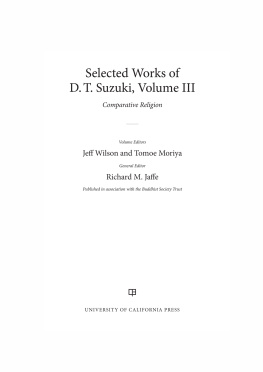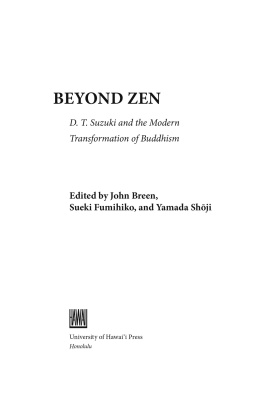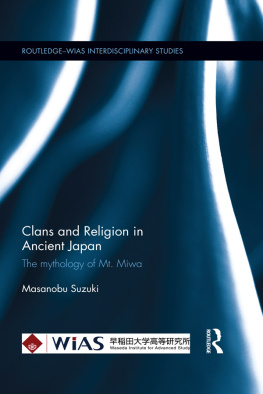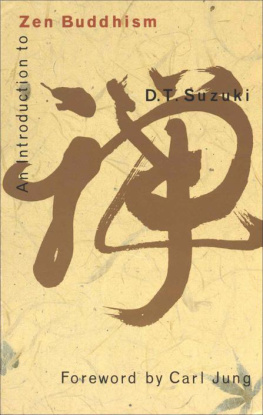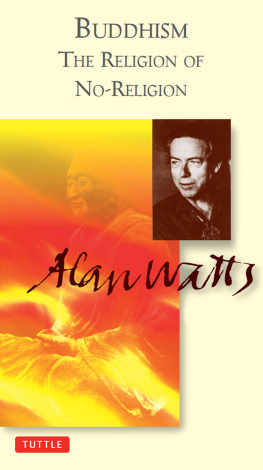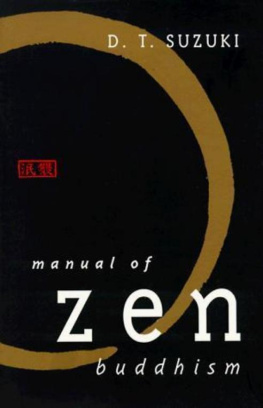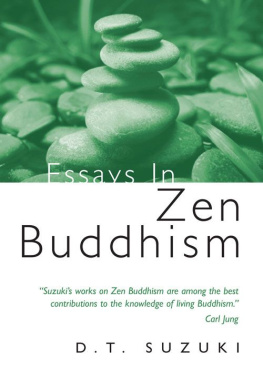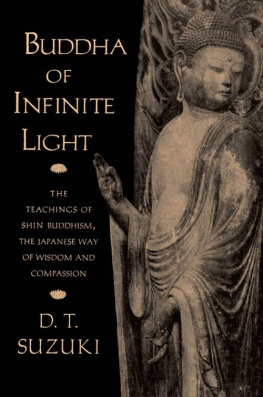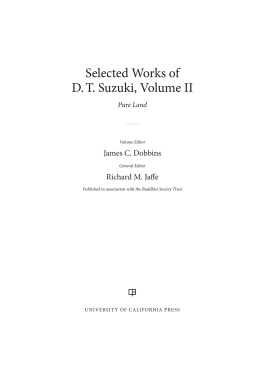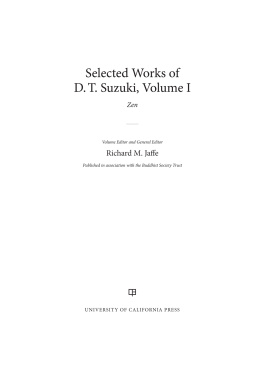ACKNOWLEDGMENTS
The cooperation and collaboration of numerous individuals and organizations were required to publish Selected Works of D.T. Suzuki. The original idea to produce a multivolume series containing newly edited versions of Suzukis essays grew out of discussions with the president of the Buddhist Society, London, Desmond Biddulph, the societys director of publishing, Nina Kidron (since retired), and Katsuyo Ban, the chief administrator of the Matsugaoka Bunko Foundation in Kamakura, Japan, which controls the copyright to Suzukis literary estate and houses his library and papers. I am grateful to them and to the other staff members of both the society and the bunko for having worked so hard to realize, at least in part, Suzukis wish to republish his English-language writings in a uniform edition, a vision he discussed with the then head of the society, Christmas Humphreys. Without the additional help and advice of Jonathan Earl, the director of publishing for the Buddhist Society, and the staff at the Society of Authors in London, who skillfully handled the complicated task of obtaining the rights to reprint Suzukis essays, publishing the four volumes in the series would not have been possible. I also thank Susannah Duerr, a masters student in religious studies at Duke University, for her assistance in compiling the glossary.
The Buddhist Society, London; Duke Universitys Asian-Pacific Studies Institute and Trinity College of Arts and Sciences; the Japan Foundation (via the Triangle Center for Japanese Studies); Mr. Luke Ding; and the Great Britain Sasakawa Foundation all provided financial support for the publication of Selected Works of D.T. Suzuki.
Permission to reprint the essays in this volume came from a variety of sources. The Matsugaoka Bunko granted permission for the inclusion of portions of Shin shky ron (A New Interpretation of Religion); letters from D.T. Suzuki to Paul Carus, Mr. Tatsuguchi, and Thomas Merton; Christianity in Japan; Confucius: A Study of His Character and History; A Brief History of Early Chinese Philosophy: Introduction and Philosophy; Zen, the Spiritual Heritage of the East; A Contemporary Buddhist View of Shinto; Zen and the Study of Confucianism; excerpts from Japanese Spirituality; Tea-Room Meditations; The Predicament of Modern Man; The Hands; Three Japanese Appeal for a Peaceful World: Open Letters to President Kennedy and Premier Khrushchev; and Religion and Drugs.
Grove Press granted permission to use excerpts of chapters 6 (Practical Methods of Zen Instruction) and 8 (The Ten Cow-Herding Pictures) from Essays in Zen Buddhism (First Series).
The Swedenborg Foundation granted permission to include the sections Swedenborg and Swedenborgs View of Heaven and Other-Power from Swedenborg: Buddha of the North.
Watkins Books granted permission to include an excerpt from Ignorance and World Fellowship from Faith and Fellowship: Being the Proceedings of the World Congress of Faiths Held in London, July 3rd17th, 1936 .
The Buddhist Society, London, granted permission to include What Is Religion?, The Analytic and Synthetic Approach to Buddhism, The Answer Is in the Question, and Love and Power.
Routledge granted permission to include extracts from Mysticism: Christian and Buddhist.
New Directions has granted permission to include Wisdom in Emptiness: A Dialogue between Daisetz T. Suzuki and Thomas Merton.
E.J. Brill has granted permission to include Buddhism and Other Religions, from Relations among Religions Today: A Handbook of Policies and Principles.
The clerics and staff at the temple Shkokuji and its Jtenkaku Museum in Kyoto, Japan, kindly granted permission to use the Oxherding Picture by Shbun that graces the cover of this volume. The calligraphic frontispiece by Suzuki is reprinted courtesy of the Matsugaoka Bunko. The portrait photograph of Suzuki on the volume cover was taken by Francis Haar and is reproduced courtesy of the Francis Haar Archive. I thank the staff of these institutions and publishers for allowing us to use these materials.
Richard M. Jaffe
Without the collaboration of Jeff Wilson, this volume would not have been possible, and I deeply thank him for his dedication and assistance. Richard M. Jaffe, our series editor, offered so much of his time and energy, together with insights on Zen Buddhism. His efforts were key to moving this volume forward. James C. Dobbins, the editor of the second volume, also supported my study by sharing materials and his scholarship on another important aspect of Suzuki, Pure Land Buddhism.
My research on Suzuki was partly supported by the Grants-in-Aid for Scientific Research program of the Japan Society for the Promotion of Science titled The Discursive Space of an Intellectual Religious Movement in Modern Japan: A Study of the Shin Bukkyo Journal from the Viewpoint of the History of Culture and Thought (grant number 20320016), led by Shinichi Yoshinaga. I also thank Hannan University and the Institute for Economic and Industrial Research at Hannan University for providing research grants.

